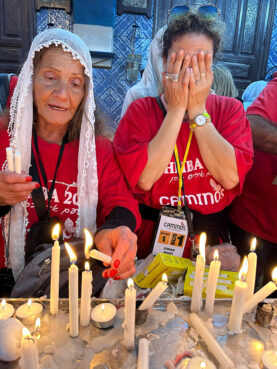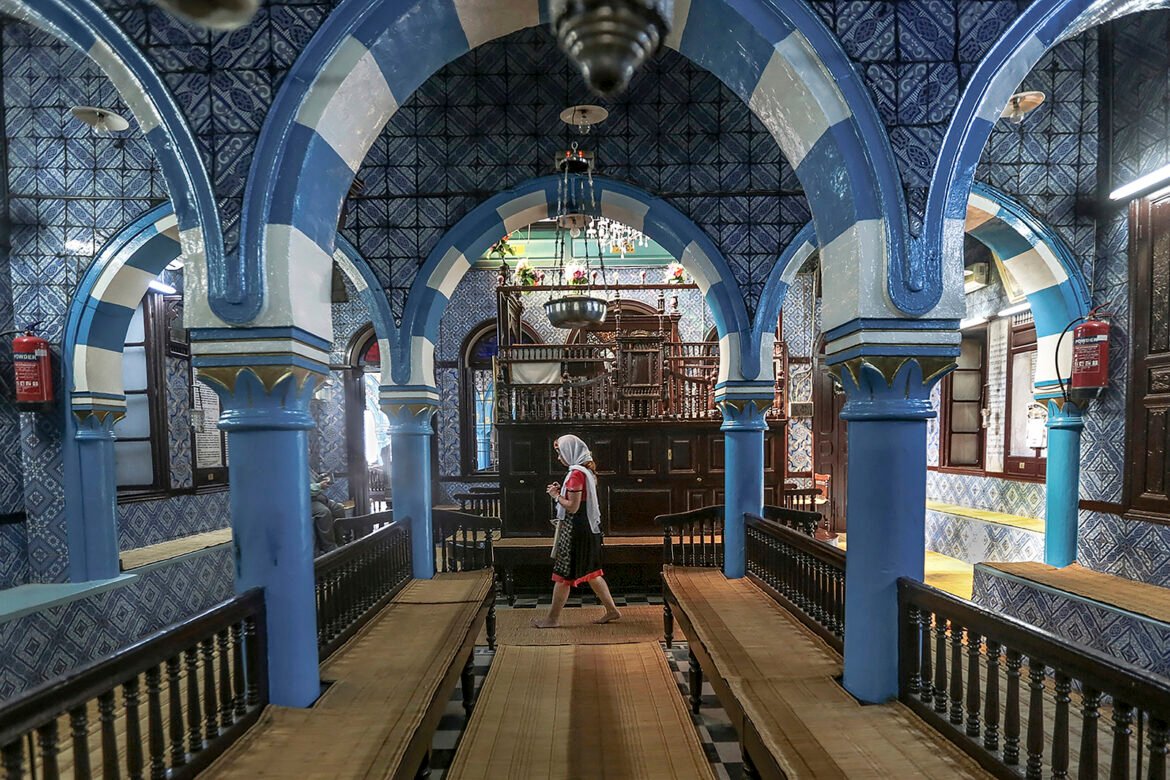(RNS) — A year after an attack killed two Jewish pilgrims and three local police at the ancient El Ghriba synagogue on Tunisia’s Djerba island, only a small crowd was in evidence for this year’s Lag B’omer pilgrimage, an event that in past years has drawn thousands. Jews in Tunisia and across the Arab world blamed a tense political climate in the wake of the Israel-Hamas war in Gaza.
“There was no pilgrimage this year basically,” said Rebekah, a French-Tunisian Jew who was one of the few who made the trip this year and who asked that her last name be withheld. “It was only the prayers for Lag B’omer and a commemoration for victims of last year.”
The pilgrimage is a deeply held tradition among the Tunisian Jewish diaspora worldwide. In past years, worshippers came from the U.S., France and even Israel, despite the lack of official relations between Tunisia and the Jewish state.
Last year, over 5,000 came for the event, and in past years attendance has been as high as 8,000.

Pilgrims light candles at El Ghriba synagogue on the Tunisian island of Djerba in May 2023. (Photo by David Benaym)
In April, just over a month before Lag B’omer, the community announced that it would not be hosting an official pilgrimage, citing security concerns.
“Those who come to visit are welcome and they can hold religious rituals, light a candle, inside the synagogue,” Perez Trabelsi, the head of the island’s Jewish community, told The Associated Press last month. In contrast, in past years, celebrations were held across the entire island.
Seventy-five years ago, Tunisia’s Jewish community was one of the largest in Africa, numbering more than 100,000, but it has since been whittled down to under 2,000.
One of the few holdouts in the North African country is in Djerba, where the Jewish community has maintained multiple schools, kosher restaurants and 12 synagogues, including El Ghriba.
“Djerbian Jews are one of the last and biggest Arabic-speaking Jewish communities that are still active,” Rebekah said. “It’s very touching to see kids wearing their kippahs in the street while speaking in Arabic. In a Muslim country, they are just existing as Jews, very vibrant and very present.”
Tradition holds that a synagogue has existed on the site of El Ghriba for nearly 2,500 years, since a group of Israelite priests settled on the island in the wake of the destruction of the First Temple in Jerusalem, bringing with them a stone from the holy site built under King Solomon. The current structure on the site dates to the 19th century.
A legend tells of a young woman named Ghriba who, after years of infertility, prayed at the spot and was blessed with a child. It has become a popular pilgrimage for young women hoping for marriage and family.
The pilgrimage was thrown into chaos last year as a Tunisian national guardsman who had been charged with protecting the site instead decided to attack, killing three of his fellow Tunisian guards and two Jewish pilgrims, Aviel and Benjamin Hadad, who were cousins.

Police officers and soldiers guard near El Ghriba synagogue in Djerba, Tunisia, May 10, 2023. (AP Photo/Moncef Abidi)
“We heard gunshots, we were terrorized, barricaded inside, we believed for hours that we were all going to be massacred, without knowing what was happening,” Rebekah wrote last year shortly after the attack. “For hours, in panic, we cried and begged God to protect us, not to let us die for the sole crime of being Jewish, of wanting to pray and light candles in our place of worship.”
It was not the first time pilgrims to the synagogue had been targeted nor the first time a member of the security force tasked with guarding the synagogue had attacked it.
In 1985, a police officer opened fire on a group of Jews celebrating the autumn festival of Simchat Torah, killing three and wounding 15. In 2002 al-Qaida detonated a truck full of explosives near the synagogue, killing 21.
After last year’s attack, the community and the Tunisian Jewish diaspora proudly noted that even before the Hadad cousins were buried and mourning rituals commenced, rituals of life had already returned to the synagogue, including the circumcision of a newborn Jewish boy held just one day after the shooting.
While the synagogue did not host large public services for Rosh Hashana and Yom Kippur in the wake of the attack, it reopened with much fanfare for the Sukkot holiday.
But Hamas’ attack Oct. 7 attack on Israel on the final day of Sukkot, also known as Simchat Torah, and the ensuing war in Gaza has changed the climate for Jewish communities across the Arab and Muslim world, including in Tunisia. Public events once attended by foreign dignitaries and local officials have largely been canceled, and many synagogues have been shuttered due to security concerns.
“There was a collective desire to make the following year’s celebrations even bigger and better, to show that they are not afraid,” said Rabbi Isaac Choua, the World Jewish Congress’ liaison to Jewish communities in the Middle East and North Africa. But after Oct. 7, he said, “the community understands the need to see the situation for what it is and recognize the heightened tensions both within the Arab world and globally.”
In December, protesters in the Tunisian city of Al Hammah destroyed a historic synagogue and in February a mob set fire to one in Sfax, though it was extinguished before the structure was consumed. Both events were reactions to events in Gaza.
“Fortunately, no Jews were left in Al Ḥammah and there are a few Jews that live in Sfax. The majority all live in Djerba and the capital, Tunis,” Choua said, adding, “This level of threat is unprecedented in the recent years for the Tunisian community, putting them on par with the global Jewish experience.”
Rafram Chaddad, a Tunisian Jewish artist and photographer, told Al-Monitor after the burning of the Al Hammah synagogue that he feared going out on the street. “The Jews are scared. In every event that Palestinians get killed, the Jews of Tunisia get attacked in turn. It’s a ritual.
“The Jews in Tunisia are (stuck) between Israel who claim (to represent) all diaspora Jews and the local Tunisian who also connects all Jews to Israel,” he added to Religion News Service on Tuesday.
Rebekah said Jewish businesses have been boycotted and several Jewish people have been targeted with threats and harassment online. “Tunisian Jewish artists also have been targeted by hate campaigns, even those of us who are very critical of Israel or very anti-Zionist.”
While Tunisia’s President Kais Saied criticized the burning, he has been accused of fanning the flames of antisemitism in the country by frequently attributing North Africa’s woes to “international Zionism.” In September he was criticized for blaming flooding in Libya on Zionism, noting that the storm that caused it was named Daniel, a name shared by a Hebrew prophet.
The situation has caused some Tunisian Jews, both at home and in the diaspora, to rethink their safety in the North African state.
Despite the closure of the formal event, Rebekah was determined to return this year, to address the trauma she experienced last year. She also said she made the pilgrimage as a way to honor her grandmother and connect with her Tunisian Identity and the life her parents left behind when they emigrated from Tunisia.
“After Oct. 7, I know several Jews who were living in Tunisia who decided to come to France and not stay in Tunisia anymore,” she said. “I know several who decided not to travel to Tunisia anymore. The general atmosphere in Tunisia now is just not very reassuring for Jews.”

